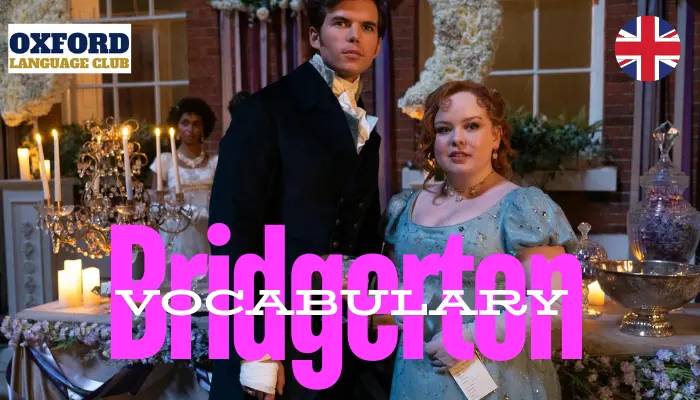Great site to keep my english skills updated for work and travel. I am really enjoying the lessons!
Maria C
 Argentina
Argentina


The popular series "Bridgerton," set in Regency-era London, has captivated audiences with its vibrant characters, intricate plots, and rich language. The dialogue in the show often reflects the vocabulary and expressions of the early 19th century, offering a fascinating glimpse into the era's lexicon. For English learners, this provides an opportunity to expand their vocabulary with terms that, while perhaps less common today, are still a charming addition to one's linguistic repertoire. Here are some key words and phrases from "Bridgerton" and their meanings:
1. Debutante
A young woman making her first appearance in society, often marked by a formal presentation or ball. In the show, debutantes are introduced to society in the hopes of finding suitable marriage matches.
Example: "The debutantes were anxious as they prepared for their grand entrance at the season's first ball."
2. To Court
To pursue someone romantically with the intention of marriage. In Regency times, courting was a formal process involving social visits and chaperoned outings.
Example: "Simon decided to court Daphne, following all the proper protocols of the time."
3. Scandal
An event or action that causes public outrage or gossip, often involving impropriety or moral misconduct. Scandals were a common concern among the upper class, as reputation was highly valued.
Example: "A scandal erupted when a secret relationship was revealed, threatening the family's reputation."
4. Viscount
A noble title ranking above a baron and below an earl. The title is often used to address or refer to someone of noble birth.
Example: "The Viscount attended the ball, attracting attention with his distinguished presence."
5. Chaperone
A person, often an older woman, who accompanies and supervises young, unmarried women during social occasions. The role of a chaperone was to ensure propriety and prevent scandal.
Example: "The young ladies were never without a chaperone during their outings."
6. Ball
A formal dance or gathering, typically held in the evening. Balls were a central feature of social life in the Regency era and provided opportunities for matchmaking.
Example: "The grand ball was the highlight of the season, with everyone dressed in their finest attire."
7. Suitor
A man who courts a woman with the intention of marrying her. In "Bridgerton," suitors compete for the favor of debutantes during the social season.
Example: "Eloise had many suitors, but she found them all quite tiresome."
8. Modiste
A term for a fashionable dressmaker. In the series, the modiste is a central figure in preparing young women for their social debuts.
Example: "The modiste crafted a stunning gown for Daphne, ensuring she would be the belle of the ball."
Watching "Bridgerton" can be a delightful way to enrich your English vocabulary, especially if you are interested in historical language and customs. While some of these words may not be commonly used today, they provide a charming insight into a bygone era and can add a touch of elegance to your English usage.
August, 2024
Posted by Oxford Language Club
Controlla il tuo punteggio - Prova il nostro quiz inglese gratuito + Ottieni un bonus gratuito